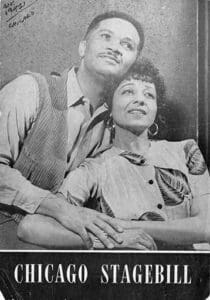Robert Todd Duncan (1903 – 1998) was a multi-talented individual who made significant contributions to the arts and civil rights movement. Born on Feb. 12, 1903 in Danville, Ky., he grew up in Somerset. Despite facing segregation and discrimination, Duncan shattered racial barriers in the theater world. He is best known for originating the role of “Porgy” in Porgy and Bess, which opened on Broadway on Oct. 10, 1935. In fact, he performed this role over 1,800 times. Prior to this breakthrough, Duncan was already a renowned baritone and voice professor at Howard University in Washington D.C., where he caught the attention of George Gershwin. His talent also extended to film, appearing in Syncopation (1942) and Unchained (1955), where he introduced the now iconic song “Unchained Melody.” This performance even earned him an Academy Award nomination. Additionally, Duncan originated the role of “Stephen Kumalo” in Kurt Weill’s Lost in the Stars (1949–50), winning both the Donaldson and New York Drama Critics awards for his stellar performance.
The renowned artist, more commonly known as Todd Duncan, completed his musical education at Butler University in Indianapolis, Ind., earning a Bachelor of Arts degree and later obtaining a Master of Arts degree from Columbia University in New York. In 1933, he made his debut at the Mecca Temple in New York with the Aeolian Opera Company, performing in Mascagni’s Cavalleria Rusticana. Five years later, he made history as the first African American to sing with a major opera company when he played “Tonio” in Leoncavallo’s I Pagliacci with the New York City Opera Company. That same year, he also starred as “Escamillio” in Bizet’s Carmen. During his run of Porgy and Bess in Washington D.C., Duncan took a stand against segregation by leading a strike against the National Theatre’s policy to only allow African Americans to attend certain performances. As spokesperson for the cast, he declared that he would never perform in a theater that discriminated based on race. This resulted in an integrated audience attending for the first time. In subsequent performances in Kentucky during the 1950s, Duncan continued his efforts toward desegregation by refusing to perform to segregated audiences and insisting
For more than half a century, he was a professor at Howard University and also traveled alongside William Allen as a soloist. His talents as a concert singer were highly praised, with over 2,000 performances in 56 different countries. In honor of his 75th birthday, the Washington Performing Arts Society hosted a gala for him in 1978. Years later, he received the George Peabody Medal of Music from Johns Hopkins University’s Peabody Conservatory of Music in 1984, along with other accolades such as the Haitian Medal of Honor, NAACP award, Donaldson Award, New York Drama Critics’ Award, and honorary doctorates from Valparaiso University and Butler University. Duncan, 95, passed away of a heart ailment at his Washington D.C. home on Feb. 28, 1998.
Source: https://kchr.ky.gov/Hall-of-Fame/Pages/Robert-Todd-Duncan.aspx
Todd Duncan and Ann Brown perform "Bess, You Is My Woman" 1940
Todd Duncan sings "Lost in the Stars" 1949-1950.
Lost in the Stars was a musical written by Kurt Weill and opened on Broadway in New York City in October 1949. Todd Duncan played the lead role of Rev. Stephen Kumalo. Duncan’s performance in the show, including singing the title song, “Lost in the Stars,” garnered both the Tony and New York Drama Critics awards in 1950.



